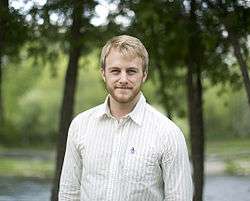Chris Bailey (author)
| Chris Bailey | |
|---|---|
 | |
| Born |
1989 (age 26–27) Red Deer, Alberta |
| Residence | Ottawa, Ontario |
| Nationality | Canadian |
| Alma mater | Carleton University |
| Occupation | Author, consultant |
| Years active | 2013–present |
| Website |
alifeofproductivity |
Chris Bailey (born 1989)[1] is a Canadian writer and productivity consultant, and the author of The Productivity Project.
Early life and education
Bailey was born in Red Deer, Alberta, and raised in Belleville, Ontario, Canada.[2] He first became interested in productivity in high school, after reading David Allen's 2001 book Getting Things Done.[3] He moved to Ottawa, Ontario, to attend Carleton University, graduating from the Sprott School of Business in 2013.[2][4]
Career
After college, Bailey took a one-year sabbatical to research and conduct experiments in productivity on himself, documenting his experiences on his blog, A Year of Productivity (later renamed A Life of Productivity).[5] He began the year-long project in May 2013, testing new and old productivity theories through experiments including living in seclusion for 10 days; limiting his smartphone use to an hour a day for 3 months; getting up at 5:30 am each morning; and experimenting with varying-length workweeks, between 20 hours and 90 hours, to find the optimal workweek length. He watched 296 TED talks (roughly 70 hours) in 7 days, and then compiled lists on his blog of 100 things he learned, the 7 characteristics of highly effective TED speakers, and 10 TED talks one can watch in order to be more productive.[3][4][6]
Insights and strategies learned from these experiments, as well as from interviews with other experts in the field, were compiled into his 2016 book The Productivity Project,[1][7] a Canadian nonfiction bestseller[8] and the top-selling nonfiction audio book on Audible.com for the week ending July 15, 2016.[9]
The main principles of the book involve learning to manage one's time, energy and attention.[1][10] Among other productivity tactics, Bailey discusses the benefits of finding one's Biological Prime Time (the unique time of day when a person has their highest energy level) and dedicating that time to performing important tasks,[1][11] through the creation of a daily to-do list limited to the three most important things that need to be accomplished that day.[5][12] In addition to a "to-do" list, Bailey recommends keeping a "done" list of one's largest accomplishments, adding to it each week and reviewing it every Sunday to gain inspiration for the week ahead.[13] He also advises sitting alone in a room for 15 minutes, allowing the brain to wonder, and taking notes with a pen and paper, a concept adapted from cognitive neuroscientist Daniel Levitin.[14]
Bibliography
Book
- The Productivity Project: Accomplishing More by Managing Your Time, Attention, and Energy (Crown Business / Penguin Random House, January 5, 2016)
Articles
- "10 Lessons I Learned from a Year of Productivity Experiments" – Lifehacker, June 3, 2014
- "Slacker success: Why working 20 hours a week is more effective than 90" – National Post, December 31, 2015
- "How Keeping Track of These Two Things Totally Transformed My Productivity" – Fast Company, January 6, 2016
References
- 1 2 3 4 P. Claire Dodson, "These Four Common Mistakes Are Making You Less Productive At Work," Fast Company, January 8, 2016.
- 1 2 Valerie Kong, "Convocation: Co-op student explores productivity," Carleton Now, June 2013.
- 1 2 Dan McGinn, "Still Trying to Get Things Done," Harvard Business Review, April 2016.
- 1 2 Kate Torgovnick May, "Man watches 296 TED Talks in a week. We ask him why.," TED Blog, October 18, 2013.
- 1 2 Anna North, "The Pitfalls of Productivity," New York Times, October 16, 2014.
- ↑ Shana Lebowitz, "A 24-year-old who spent 10 days working in complete isolation discovered a key insight about productivity," Business Insider, February 17, 2016.
- ↑ Courtney Shea, "Five habits that help Chris Bailey stay productive," The Globe and Mail, January 10, 2016.
- ↑ "Canadian non-fiction," Toronto Star, March 25, 2016.
- ↑ "The top 10 audiobooks on Audible.com," Star Tribune, July 19, 2016.
- ↑ Chris Bailey, "10 Lessons I Learned from a Year of Productivity Experiments," Lifehacker, June 3, 2014.
- ↑ Lauren La Rose, "Tips to boost productivity from the man who wrote the book on it," Metro, January 19, 2016.
- ↑ Andrew Merle, "The Power of the Three-Item To-Do List," Huffington Post, March 21, 2016.
- ↑ Melissa Dahl, "Work Smarter: Why You Should Add a 'Done List' to Your To-Do List," New York, July 17, 2014.
- ↑ Shana Lebowitz, "A productivity expert says this 15-minute daily exercise can make you more successful," Business Insider, February 8, 2016.